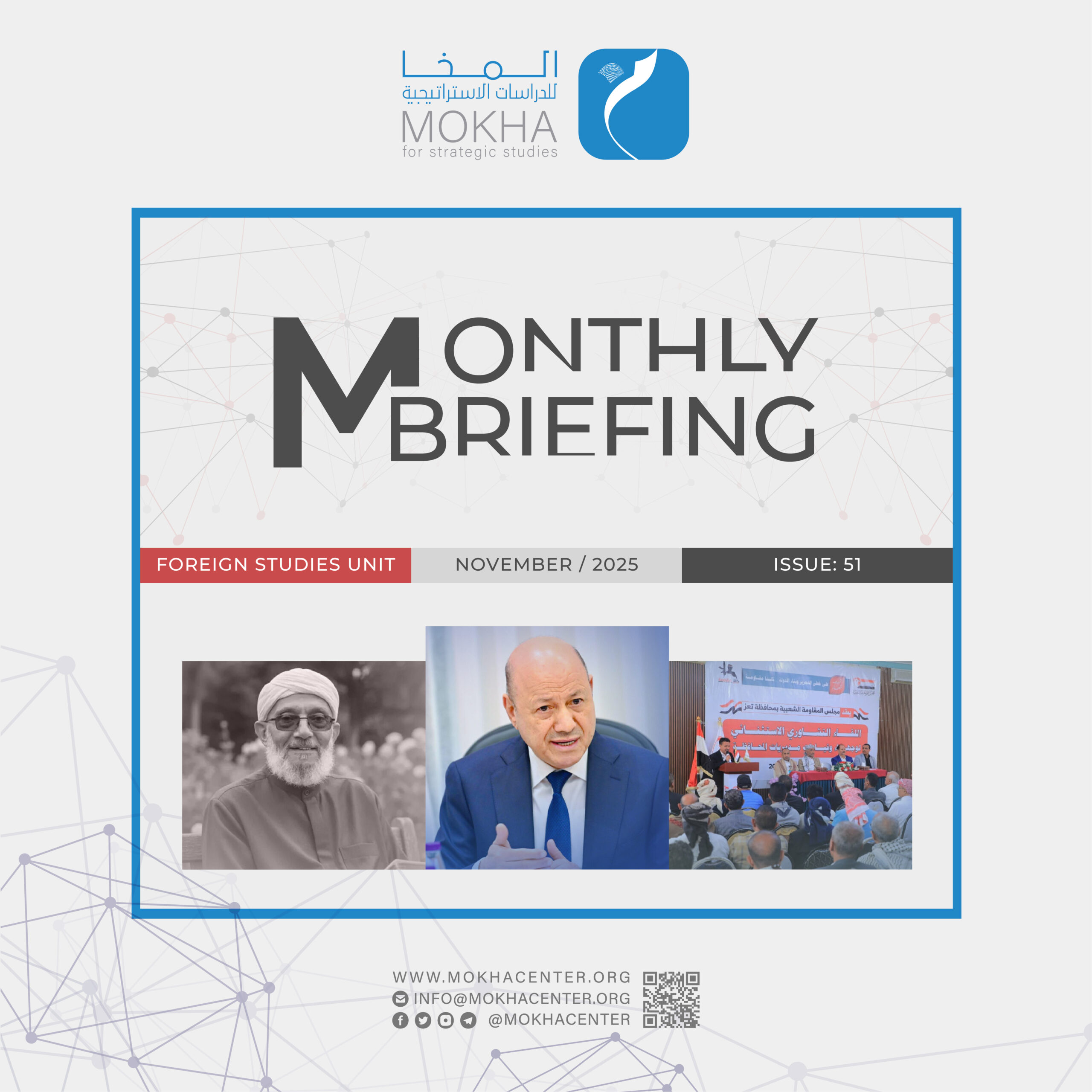Monthly Briefing /September– 2024

Political scene
The Yemeni peace consultations are facing a stalemate due to Houthi attacks in the Red Sea and U.S. pressure to postpone any agreement. Meanwhile, the internationally recognized legitimate government has welcomed a political solution, according to a UN roadmap. The confidential United Nations report on Houthi activities and their transformation into a military force supported by Iran’s Revolutionary Guard and Hezbollah reduces the chances of the country achieving lasting peace.
- During a meeting with the Middle East Minister, Hamish Faulkner; U.S. Special Envoy to Yemen Tim Lenderking; and the U.S. and Saudi ambassadors in London, the British government affirmed that achieving peace in Yemen is vital for regional stability. September 11
- U.S. Special Envoy to Yemen Tim Lenderking affirmed that Houthi actions in the Red Sea are obstructing peace efforts. He accused the group of exploiting the Gaza war to extend their power. September 12
- In a speech to the UN Security Council, delivered by Abdullah Al-Saadi, Yemen’s Permanent Representative to the United Nations, the Yemeni government reiterated its support for international efforts to end the conflict in the country. It called on the Security Council to pressure the Houthis into ending the war, warning of an environmental catastrophe in the Red Sea. September 12
- The UN envoy to Yemen, Hans Grundberg, concluded his visit to the United Kingdom with high-level meetings focused on enhancing international efforts to support Yemen’s stability, address economic challenges and deal with regional tensions. September 18
- In his briefing to the Security Council on September 12, UN envoy Hans Grundberg highlighted the complexity of peace efforts in Yemen due to regional escalation and called on the Houthi group to release detainees. The following week, the UN envoy visited Tehran, where he met with Iran’s Foreign Minister and emphasized the need to resume negotiations. September 18
- Chairman of the Presidential Leadership Council, Rashad Al-Alimi, discussed peace efforts in Yemen with the UN and U.S. envoys and international officials on the sidelines of the United Nations General Assembly meetings. Al-Alimi affirmed his support for a comprehensive political process and called for international pressure on the Houthis to engage in mediation efforts. September 26
- Lenderking warned that the transfer of weapons from Russia to the Houthis could alter the nature of the conflict in Yemen, emphasizing the importance of diplomatic solutions to reduce escalation in the Red Sea. September 27
- UN envoy to Yemen Hans Grundberg announced that the escalation in Lebanon is further destabilizing the Middle East and hindering a peaceful settlement in Yemen. This statement came following Israel’s announcement of “Operation Northern Arrows” against Hezbollah and the assassination of the group’s Secretary-General, Hassan Nasrallah. September 28
A confidential United Nations report stated that the Houthis have transformed into a formidable military force with the support from Iran’s Revolutionary Guard, Hezbollah and Iraqi specialists. They received training outside Yemen, used forged passports and launched attacks on ships in the Red Sea, with increasing coordination with al-Qaeda. September 26
Military scene
The military situation in Yemen escalated as the Houthis intensified their offensives in Lahij, Al-Dhale, Ma’rib, and Taiz, while also continuing attacks on ships in the Red Sea. Meanwhile, Israel conducted airstrikes on the port of Hodeida.
- Pro-government “Giants’ Forces” took control of a strategic mountain range in Mawiyah District, eastern Taiz, following intense battles with the Houthi group. September 8
- Mohamed Hussein Sarour, a Hezbollah leader and envoy to Yemen for training on missiles and drones, was killed during an Israeli air strike in the southern suburbs of the Lebanese capital, Beirut, amid recent events. September 10
- The U.S. Navy announced that it intercepted several missiles and drones launched by the Houthis while passing through the Bab al-Mandab Strait. Meanwhile, the Houthis declared that they targeted three American destroyers in the Red Sea with 23 missiles and drones. September 27
Israeli occupation forces conducted intensive air strikes on vital facilities in Hodeidah Governorate, resulting in the deaths of four individuals. The strikes also destroyed power stations and oil tanks. September 29
Security scene
- The operation to transport the Greek oil tanker “MT Sounion,” which was attacked by the Houthi group in the Red Sea, has begun, with Saudi Arabia transferring its cargo of one million barrels to avoid a potential environmental disaster. September 15
The Houthi group threatened to ban the satellite internet service “Starlink” in Yemen, considering it a threat to national security, following the announcement by the company and the Yemeni government to officially activate the service. September 19
Economic scene
Banks in Sana’a are suffering from a severe liquidity crisis, notably the Yemen International Bank, which has been unable to meet customer withdrawal requests and has been forced to lay off employees. Experts believe that the crisis stems from the Houthis’ control of the Central Bank since 2014, the freezing of deposits and the exploitation of funds for political purposes, leading to a loss of confidence in the banking system in the country.
- The Houthi group has imposed new taxes and levies on traders in areas under its control, as part of its efforts to boost revenue by varying rates exceeding 30%. September 5
- American businessman Elon Musk officially announced the launch of his satellite internet service Starlink in Yemen. September 18
The Central Bank of Yemen in Aden announced that the following five exchange companies’ assets will be frozen for operating without the necessary licenses. The companies are: Al-Hattar, Al-Muhayyib, Al-Barq, Al-Badani and Adel Al-Badji. September 19
Violations and Rights
Yemen witnessed an unprecedented escalation in human rights violations during the celebrations for the 62nd anniversary of the September 26 Revolution. The Houthi group launched a widespread crackdown on celebrants in several governorates, particularly Ibb, Amran, Sana’a and Dhamar, during which dozens of activists and academics were kidnapped.
- Director of the Friedrich Ebert Foundation in Yemen, Konstantin Grund, criticized the Houthis accusing them of employing repressive methods and escalating violence, including the detention of 60 employees working for international organizations. This comes alongside a call from the United Nations High Commissioner for the immediate release of 17 employees detained by the group, including six who have been held for three months. September 3
- A human rights report revealed that the Houthi group has committed 7,742 violations against civilians in Al-Bayda Governorate since 2015. These violations resulted in the deaths of 842 civilians and the displacement of 80,000 families. September 6
- Rights Radar report revealed that 2,099 farmers and herders have been killed since 2014 due to landmines and indiscriminate shelling, with children and women suffering the most casualties. September 10
- The Houthi group issued a death sentence against the director of Yemen Digital Media, accusing him of supporting what they refer to as the “aggression” and spreading false news. They also confiscated his assets and the company he manages, valued at millions of dollars, including visual archives and real estate documents. September 28
- The Rights Radar organization reported the detention of 428 civilians by the Houthi group in 10 Yemeni governorates due to their celebration of the September 26 Revolution anniversary. September 28
Young Yemenis have called on the Yemeni government and its embassy in Russia to rescue them after falling victim to a recruitment gang in Oman. They were lured with promises of work in Russia for a monthly salary of $2,500, only to find themselves sent to fight in the war against Ukraine. September 28
Humanitarian scene
Food insecurity rates in Yemen are reaching record levels, with a never-before-seen 62% of households suffering from inadequate food consumption and 36% experiencing severe deprivation due to deteriorating economic conditions and the ongoing impacts of war.
- A UN report indicated that at least 123 African migrants have drowned in incidents while attempting to reach Yemen between April and July of 2024. The International Organization for Migration (IOM) documented four drownings, highlighting the dangers faced by migrants on their journey from the Horn of Africa to Yemen. September 16
- The Yemeni government described the situation of the Houthi coup, 10 years later, as “catastrophic and tragic,” stating that the Houthis have led the country to historical setbacks through human rights violations, child recruitment and economic destruction, while their leadership lives in luxury. September 21
The UN’s World Food Programme confirmed the ongoing food insecurity in Yemen, with the percentage of families suffering from insufficient food consumption rising to 64% in August 2024. This figure includes 65% in government-controlled areas and 64% in Houthi-controlled regions. September 29
General News
- Ma’rib, Taiz and Seiyun witnessed extensive celebrations of the 62nd anniversary of the September 26 Revolution, featuring scouting displays and public events, reaffirming the commitment to the revolution’s goals. September 25
Hamtramck, Mich. Mayor Amer Ghalib’s support for former President Donald Trump in the upcoming U.S. election has sparked widespread controversy among the Yemeni and Arab communities in America, due to Trump’s previous policies toward Yemenis and Muslims. September 27
Statistics
- The National Commission to Investigate of Alleged Violations of Human Rights announced the documentation of 3,055 cases of violations in Yemen, resulting in 13,028 victims, from August 2023 to July 2024.
- Since the Commission’s establishment in January 2016, the total number of violations has reached 29,701 cases, with 63,772 victims, distributed as follows:
- 694 Incidents: 294 killed (including 13 women and 52 children) and 593 injured (including 118 children and 69 women).
- Child Recruitment: 126 cases, most of them by the Houthis.
- Mine Explosions: 128 cases, resulting in 52 deaths (including 12 children) and 86 injuries.
- Forced Displacement: 165 incidents, 153 attributed to the Houthis.
- Arbitrary Detention: 655 cases,495 of which were attributed to the Houthis.
- Torture: 28 cases, 22 of which were attributed to the Houthis.
- Destruction of Cultural Properties:17 incidents, 16 of which were attributed to the Houthis.
Targeting by U.S. Aircraft: 4 cases, resulting in 7 victims.

